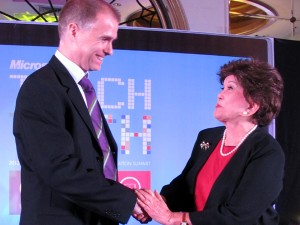
John Bessey, Microsoft Philippines Managing Director, and Esther Vibal, Chairperson of the Vibal Group of Companies, shake hands during the Annual Innovative Education Forum organized by Microsoft to seal the partnership between the two companies.
MANILA, Philippines – Can you imagine a classroom without chalk and blackboard, manila paper, cartolinas, one-fourth sheets of paper, pencils, erasers, and attendance sheets?
The leading Philippine educational materials publisher Vibal Publishing House Inc. and international computer software company Microsoft have not only imagined it, they are working on making that a reality.
Vibal and Microsoft, in cooperation with the Department of Education (DepEd), have partnered to create a new kind of classroom set to enter the digital era.
They are making this possible through the introduction of e-textbooks that can be accessed by students on tablet computers.
Chris Datol, operations manager of Vibal’s subsidiary Vibe Technologies Inc., said during the Annual Microsoft Philippines Innovative Education Summit last March 2 that “a child becomes smarter when he or she uses a digital device and consumes digital material.”
He cited a study conducted by the United Nations who found that students “exhibited better performance” because of the highly visual and multimedia content that tablets can show to students.
E-textbooks will have multimedia features like educational videos, full-color pictures, instructional audio content, customizable text, interactive quizzes, online connectivity allowing external links to resource websites, study tips, and many more.
Teachers will be able to use the annotated teacher’s edition of the e-textbooks that includes a lesson guide, answer keys, and teaching tips to help the teacher guide the students in using the e-textbooks.
Schools in Korea utilize tablet PC’s for students while teachers use “intelligent” white boards, Datol said. A survey of UNESCO rated Korean’s as the most intelligent digital readers “because they know how to search for online content and adapt new skills especially in using technology,” Datol said.
In June of 2011, Vibal distributed 1,000 tablets to public school students in Laguna that have built-in Rizaliana classics. Dubbed as “eRizal” tablets, they were distributed in commemoration of the 150th birth anniversary of the Philippine National Hero, Jose Rizal.
Foundation University in Dumaguete purchased eight Vibal e-textbooks for their iPad 2 units in July of 2011.
In September 2011, La Salle Greenhills rolled out an entire digital curriculum from their elementary to high school honor classes using 14 e-textbooks in 500 Galaxy Samsung tablets. La Salle will issue another 5,000 tablets in 2012 to cover all students and teachers.
Digital tools for teachers
Michelle Casio, the Education lead of Microsoft Philippines, said that they not only would improve the learning process of the students but also the teaching process of the teachers.
Microsoft offers various digital tools for teachers and school administrators that are “60 to 80 percent [discounted] compared to commercial pricing,” Casio said.
“It’s about giving the value. If you have our software … there are a lot of tools that can be attached for free,” Casio said.
She reiterated that “it’s not about making money out of the schools or out of the students. It’s about sharing the technology [and] it’s about learning.”
“Our priority really is to equip the students and the teachers [to] help them in the teaching and learning process,” Casio said.
During the summit, several school administrators shared their experiences of using digital tools in the academy.
Miriam College shared their experience of using a number of programs from Microsoft for their financial system.
Benhur Ong, Dean of the School of Management and Information Technology of College of Saint Benilde, shared how they were able to integrate technology into their curriculum.
“We need to adopt technologies that will help increase the employability of our graduates,” Ong said during his speech.
Investment weight
Casio said that “most of the weight of investments of Microsoft [for] education” was in the public schools.
“Our focus is the DepEd, because it is more than 90 percent of the [education] population,” Casio said.
As of the 2010-2011 school year, there were 38,351 public elementary schools and 7,268 public highschools, the latest figures obtained from the DepEd website showed.
On the other hand, there were 7,613 private elementary schools and 5,682 private highschools.
Casio said that they were not focusing on private schools because “they can take care of themselves, they have money and resources.”
“But we are not disclosing the private schools, we also help them,” Casio added.
Through all the partnerships and investments being poured by Microsoft into the education sector of the Philippines, classrooms, regardless of whether in a private or public school, might one day find no need for chalks and blackboards. A digital classroom will no longer be something that is left to the imagination.